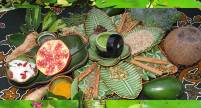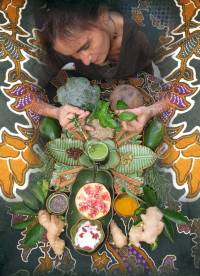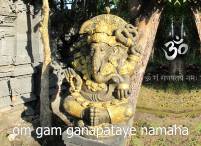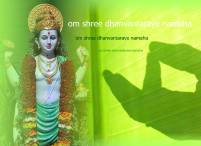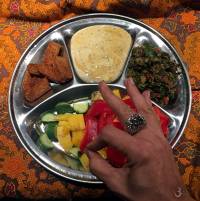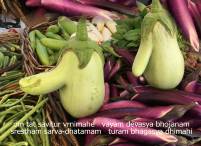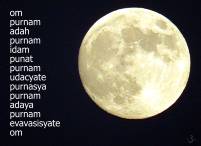eating and preparing food as a spiritual practice, sadhana
"But eating well is an art. It is not just stuffing. It is great art: to taste the food, to smell the food, to touch the food, to chew the food, to digest the food, and to digest it as divine. It is divine; it is a gift from the divine. Hindus say, Anam Brahma – food is divine. So with deep respect you eat, and while eating you forget everything, because it is a prayer. It is an existential prayer. You are eating the divine and the divine is going to give you nourishment. It is a gift to be accepted with deep love and gratitude." ~ OSHO
In the course of my life I have learned to listen to my body. I've developed a fine sense of what's good for me and what's not so good for me. Eating and preparing food have become a healing, spiritual practice for me. I understand that I am only "healed" when everything I eat, everything that surrounds me, and everything that I do, is healing. So I consider food as a cure. Food has to nourish and heal me. So I exclude a lot. How can artificially created food heal me? How can sugar cure me? How can something that has been treated with chemical toxins cure me? How can something heal me that has been mass-produced in a factory? How can anything heal me if it was produced even under the most adverse circumstances? How can something heal me if it grew up joyless? Food is one of the holiest gifts that gives us the existence. That's why I feel obliged to keep the soil on which my food grows clean. Our earth is so precious. Unfortunately, it is destroyed by greed.
I live according to yogic principles and of course that includes "Ahimsa". "Ahimsa" I will later devote an entire article. For me it is impossible to describe "Ahimsa" in a few words, otherwise you would misinterpret it. In this article I just want to express that my life is characterized by harming no living being. That's why I do not eat anything that could come from an animal. I also make sure that plants do not necessarily die because I want to eat them. I grow salad and herbs myself and let them grow out, come to bloom. I only take the leaves that I need in one day. This is a small example.
Each food can only give me what it has got and was allowed to experience. A plant bred with love passes on love. That would certainly be the same with animals and maybe that was how it was, but where do you find these animals today? Even in organic farms, this does not happen. Maybe there are exceptions. Certainly. Each food contains its own personal history. Everything that has been given him by nature or processing, it carries within itself and transmits it. That's why I pay attention to where my food comes from, and most of the time I do not like it when it's too much processed.
I am what I eat and how I eat.
Food preparation as a spiritual practice, sadhana
I make sure that I cook my food in a peaceful environment. There is peace in me then. I concentrate fully on preparing. First, I light a candle and sing or recite a mantra to make the room swing. I use fire for cooking. Electric stoves may be handy, but is not my food full of electric rays, thereby? Fire is full of natural energy and this energy is released to the food. As far as possible, I use only my hands when preparing. I used to like Smoothies & Co too. I also used other food processors. But I came to realize that such a "mix" does not do justice to the individual foods. Every plant, every vegetable, every fruit, every herb or every spice has its own taste. And that is lost through such mixtures. At some point I found the electrical crushing or mixing also very aggressive. Such devices were loud and did not fit into my peaceful silence. I felt distracted and disconnected. That's why I prefer to use my hands and connect with every leaf, every fruit, the vegetables, the grain ... By touching, chopping, kneading, ... I allow the energy of the food and my energy to connect. I will become one with the food.
Nature has given me my hands as a tool and I have learned to use them. I can do so much with my hands: measuring, tearing, picking, mixing, massaging, rolling, kneading, etc., and if I then need a tool, then I use a manual utensil, such as a mortar, grater, sieve or hand mill. And if it cannot be otherwise, I'll take a knife too. I express my gratitude to these tools. Sometimes it's just a quick nod. Sometimes the Anjali Mudra, but never verbal. Every gesture I do in a grateful attitude. I also take care not to waste anything. That is then again in the sense of "Ahimsa".
Of course I do not always have that much time. But often I perceive the food first with all sense organs. Before I process it, I touch the surface. Is it smooth, rough, hairy, wet, etc? I absorb the smell in me. Of course you can also hear food when you are working with them. I look at it closely and what about taste? In Ayurveda, you do not actually try to cook, especially if you eat like me - sattvic. But the "tasting" will come later when eating!
The food preparation depends very much on the season. I do not cook in the warm months. Then I live pretty archaic too (raw). The only exception is the roast of tofu or tempe. From time to time. When it gets cooler, I like it warm. It is important to me that everything is always fresh. I never heat up. And most importantly, everything is prepared with love and awareness. Food preparation is one of the most important everyday sadhana for me. Try it out too!
These are the mantras that I use when preparing:
invocation to Ganesha
om gam ganapataye namaha
With Ganesha basically my day starts. And when I come to the kitchen, I recite his mantra. Ganesha reminds me that I have the strength to overcome obstacles. He reminds me to listen to my inner voice. This voice contains my own wisdom. For example, the wisdom, which is good for me, which is good for this world. And he reminds me that I trust myself. This self-confidence makes everything I do good. And therefore my food, too.
for the fire:
om hum ram caitanya namaha - om hrim agni-rupaya hrim namaha
Agni is important in Ayurveda, not only as the fire of digestion in the stomach, but there are ten different Agnis, transformations of different things in man, different substances. All this is needed for Agni. The Vedas often speak of Agni. Agni, the essence of fire, Agni, the fire god. In my little "fire ritual," I see Agni as the essence of fire and honor Agni as the mediator between the human and the spiritual. I also use this mantra to counter all kinds of dangers emanating from the fire.
Ayurveda has a very special mantra for preparing food:
Om shree dhanvantaraye namaha
This Mantra is considered one of the most healing mantras of the ancient sanskrit mantras and is beneficial for physical, mental and psychological problems. It is used to help recover from chronic diseases and other body aliments. Dhanvantaree is the mythological founder of the Ayurvedic system. Dhanvantaree is considered the incarnation of the god Vishnu. He is the god of healing, who brought a vessel of immortality to humanity and it is said all important Ayurvedic plants have gotten drips from this healing potion. When I recite or sing the Dhanvantaree mantra, it means that I want to be salvation. I want healing energy to work through me as I prepare the food. Ultimately, all healing power comes from God (the Existence, the Divine) Himself. By reciting the Mantra, I want to let the Divine work through me, giving healing energy to the food.
General healing mantras:
Om bhur bhuvah svaha - tat savitur varanyam - bhargo devasya dheemahi - dhiyo yo nah prachodayat
The Gayatri mantra is my favorite mantra and it has been with me for so many years. The Gayatri is one of the most healing and beneficial of the ancient sanskrit mantras. It opens the door of perception, understanding and wisdom. Gayatri mantra creates more consciousness, more awareness and therefore allows me to become more tuned in with ourselves. Through a greater awakening of our being the Gayatri mantra can be used to and expand our creativity. And creativity is something very important when preparing food, right? On a deeper level the Gayatri mantra works on our physical, emotional, and mental bodies helping us to heal and purify ourselves. Gayatri is also the light energy. In all events, behind all happenings is this divine light. So, too, when I prepare my food. The light is in the food, the light is in me, the light is in the energy that I need to be able to prepare the food at all. With the recitation of the Gayatri I celebrate the Divine Light!
om tryambakam yajamahe sugandhim pushti-vardhanam urvarukamiva bandhanan mrityor mukshiya mamritat
The Maha Mrityunjaya Mantra restores health and happiness and brings calmness. It awakens a healing force that reaches deep into the body and mind. Just as a plant patiently gathers nutrients from the soil, so healing and nourishing forces enter the human body through foods, medicines, supportive emotions, and encouraging thoughts. The Maha Mrityunjaya Mantra attracts these forces and creates an inner environment to enhance their effectiveness. I recite this mantra can be when I take medicines. It prepares my body and mind to make the best use of them. And because I regard food as "medicine", sometimes I also sing this typical Ayurvedic mantra in the preparation of food.
raa maa daa saa saa say sohung
"Sun, Moon, Earth, Infinity, All that is in infinity, I am Thee."
The Siri Gayatri Mantra comes from the Sikh tradition. It is a mantra full of healing energy. Perfect if I prepare food, or!
om shanti shanti shanti
"om peace peace peace"
I know this short mantra from Bali. There you start everything with the greeting "Om Swastiasthu" and finish it with the "om shanti shanti shanti". I basically use it when I finish or leave something.
Have you ever made a prayer out of eating?
Eating as a spiritual practice
When I came to Bali for the first time, I wondered why the Balinese eat quickly and all by themselves. For them, it seemed strange to talk during a meal. Food was not necessarily a social event, unless a big party took place. Then there was a ritual meal, but even there, the individual people sat alone and ate completely for themselves. (In the meantime, of course, that has changed a bit.)
When I started to study Ayurveda much later, I realized why the Balinese had such a very different eating behavior than I knew from the West. They eat consciously, concentrated.
That fascinated me. Gradually, I learned how to turn food into a spiritual practice. It is always important for me that I try everything first. Then I feel from my own experience what is right for me. Knowledge and regulations, experience and own actions - these are very different things. So in the end, listen to your heart.
From my heart, I have been eating with my hands since my childhood. Of course, my dad did not like it that much, but Mom allowed me to do that at home. You can certainly imagine that as an adult I felt really home in South Asia!
When I eat with my hands, I feel one with nature, the elements, and of course my own nature. That's the only way I can really get in touch with food before I eat it. When I'm not in a restaurant, I eat on the floor. This additionally strengthens the harmony with the elements and Mother Earth.
The food should never be taken for granted. Meet the food with gratitude. Make a little prayer out of your heart. It does not have to be great, but it should be true. A true "thank you" from your soul causes more than a memorized prayer or mantra. Nevertheless, I like to sing or recite a mantra before eating. My life is made up of deeply felt mantras.
In Bali, it is customary to sacrifice part of the food beforehand. In our house were at the important places always small-cut banana leaves with some rice. Rice means prosperity for the Balinese and is also the symbol of the goddess Dewi Sri (in India: Lakshmi) One of the important places was also the stove, so to speak the original old "house fire", as I have learned in Ayurveda. This giving-away from the food feels good. It's also a part of gratitude.
Before I start eating, I close my eyes briefly. It is a retreat into silence, the beginning of absolute silence, to become one with the meal. Silence does not just mean that I do not speak. It also means that I do not do anything else while eating. So do not read, do not listen, do not think and do not look. No book, no mobile phone, no TV, no music, no thoughts (that's probably the hardest!)
Then I start a short alternating breath. With that I clean my nostrils. Breathing through the nose during the meal is much easier. (You can find the alternating breathing/ Nadi Shodhana under the traditional sadhanas). Alternating breathing also prepares me for conscious eating.
I like to take my time eating. I prepare my meals with love and I would like to eat them in love. So do not be rushed and not in an environment that has bad influences. This is important for me at every meal, as well as for meals that I have with others. If you take your food in a negative mood, it will damage you rather than make you feel alive. Maybe you've noticed that before.
If you take your time eating, then you can also taste the individual ingredients. Yes, you do not just taste them, you feel how different their consistency is. But when I eat in silence, I do not think about it. It's just a here and now.
Another form of meditative eating is that I imagine during the meal, where exactly these vegetables, etc. come from. How it has grown, how many people have worked for me, that I can eat it now, and so on.
Because I eat with my hand, I can form the other hand into a mudra. I always use the Gyan-Mudra. That's my "Universal Mudra", so to speak. With this Mudra, I make every "mundane" action something divine!
I have learned the conscious food only through Asia and Ayurveda. It was also known earlier in the West. Do you remember that you used to sit together at the table and then once a prayer was spoken? In the past people did not speak during meals. I know that more from old films and felt that as strange. Today I think it's wonderful. I think a common silence at the table is a nice experience for a family as well. This is certainly better than talking about everyday things and worries while eating.
Finally, I express once again my gratitude. A nod, the Anjali Mudra, an inward prayer. I also close my eyes once again and realize that you have just eaten God, the Divine.
It is also beautiful, if you just stay seated. Meditation!
Mantras that I like to sing or recite before or after meal:
But I also like to use the mantras that I have already explained to you in the article on the preparation of food, for example the Gayatri, and so on ... (see above)
om tat savitur vrnimahe
vayam devasya bhojanam
srestham sarva-dhatamam
turam bhagasya dhimahi
Mantra for health and a good appetite
(from the Rig Veda)
Om Purnam-adah purnam-idam Purnaat purnam udacyathe
purnasaya purnam-adaya purnam-eva vashishyathe
Om Shantih Shantih Shantih
Purnam Mantra: This is a mantra that also expresses that the divine is in every food. Accordingly, take the food deliberately to you. Be grateful.
Om, That (Outer World) is Purna (Full with Divine Consciousness); This (Inner World) is also Purna (Full with Divine Consciousness); From Purna comes Purna (From the Fullness of Divine Consciousness the World is manifested) ,
Taking Purna from Purna, Purna Indeed Remains (Because Divine Consciousness is Non-Dual and Infinite).
Om Peace, Peace, Peace.
OM Sahana Vavatu
Sahanau Bhunaktu
Saha Viryam Karavavahai
Tejasvi Navaditamastu
Ma Vidvishavahai
OM Shanti Shanti Shantihi
This is a beautiful mantra when you eat together with other people or your family in a spiritual way.
Let's learn together,
let us enjoy together (the food),
may we be strengthened together by the Sadhana,
may shine our minds and we do not indulge in the dispute us.
Om peace, peace, peace
Soon you will learn more about food as spiritual practice, for example: sattvic diet, and so on ...
My website has no claim to be scientific. It should only serve as inspiration.
HARI OM and Namaste!
I am pleased that you have visited my website.
I am happy to answer any questions or give you information. I am open to spiritual exchange. Please use the following contact form.
With love, Ma Prarthana Nisarga
(Hari OM means: May our hearts be interconnected and aware that we are part of a cosmic whole. May we contribute something together to the Cosmic Whole!)
OM SHANTI SHANTI SHANTI OM
